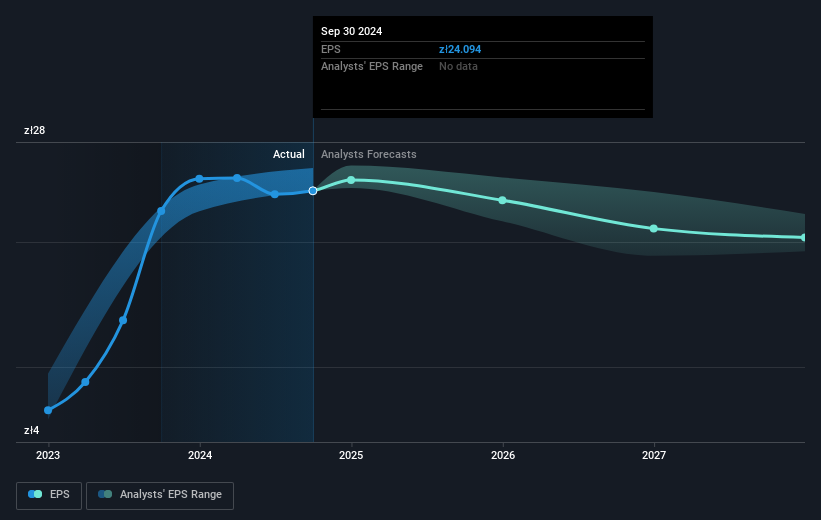Investors in Bank Polska Kasa Opieki (WSE:PEO) have seen favorable returns of 71% over the past five years

When we invest, we're generally looking for stocks that outperform the market average. And in our experience, buying the right stocks can give your wealth a significant boost. To wit, the Bank Polska Kasa Opieki share price has climbed 34% in five years, easily topping the market return of 22% (ignoring dividends). On the other hand, the more recent gains haven't been so impressive, with shareholders gaining just 2.4%, including dividends.
So let's assess the underlying fundamentals over the last 5 years and see if they've moved in lock-step with shareholder returns.
View our latest analysis for Bank Polska Kasa Opieki
In his essay The Superinvestors of Graham-and-Doddsville Warren Buffett described how share prices do not always rationally reflect the value of a business. One flawed but reasonable way to assess how sentiment around a company has changed is to compare the earnings per share (EPS) with the share price.
During five years of share price growth, Bank Polska Kasa Opieki achieved compound earnings per share (EPS) growth of 23% per year. This EPS growth is higher than the 6% average annual increase in the share price. So it seems the market isn't so enthusiastic about the stock these days. This cautious sentiment is reflected in its (fairly low) P/E ratio of 5.72.
The company's earnings per share (over time) is depicted in the image below (click to see the exact numbers).

We know that Bank Polska Kasa Opieki has improved its bottom line over the last three years, but what does the future have in store? This free interactive report on Bank Polska Kasa Opieki's balance sheet strength is a great place to start, if you want to investigate the stock further.
What About Dividends?
As well as measuring the share price return, investors should also consider the total shareholder return (TSR). The TSR incorporates the value of any spin-offs or discounted capital raisings, along with any dividends, based on the assumption that the dividends are reinvested. Arguably, the TSR gives a more comprehensive picture of the return generated by a stock. In the case of Bank Polska Kasa Opieki, it has a TSR of 71% for the last 5 years. That exceeds its share price return that we previously mentioned. The dividends paid by the company have thusly boosted the total shareholder return.
A Different Perspective
We're pleased to report that Bank Polska Kasa Opieki shareholders have received a total shareholder return of 2.4% over one year. Of course, that includes the dividend. However, that falls short of the 11% TSR per annum it has made for shareholders, each year, over five years. Potential buyers might understandably feel they've missed the opportunity, but it's always possible business is still firing on all cylinders. While it is well worth considering the different impacts that market conditions can have on the share price, there are other factors that are even more important. Case in point: We've spotted 2 warning signs for Bank Polska Kasa Opieki you should be aware of, and 1 of them is concerning.
We will like Bank Polska Kasa Opieki better if we see some big insider buys. While we wait, check out this free list of undervalued stocks (mostly small caps) with considerable, recent, insider buying.
Please note, the market returns quoted in this article reflect the market weighted average returns of stocks that currently trade on Polish exchanges.
Valuation is complex, but we're here to simplify it.
Discover if Bank Polska Kasa Opieki might be undervalued or overvalued with our detailed analysis, featuring fair value estimates, potential risks, dividends, insider trades, and its financial condition.
Access Free AnalysisHave feedback on this article? Concerned about the content? Get in touch with us directly. Alternatively, email editorial-team (at) simplywallst.com.
This article by Simply Wall St is general in nature. We provide commentary based on historical data and analyst forecasts only using an unbiased methodology and our articles are not intended to be financial advice. It does not constitute a recommendation to buy or sell any stock, and does not take account of your objectives, or your financial situation. We aim to bring you long-term focused analysis driven by fundamental data. Note that our analysis may not factor in the latest price-sensitive company announcements or qualitative material. Simply Wall St has no position in any stocks mentioned.
About WSE:PEO
Bank Polska Kasa Opieki
A commercial bank, provides banking products and services to retail and corporate clients in Poland.
Undervalued established dividend payer.
Market Insights
Community Narratives



